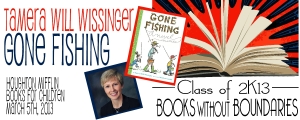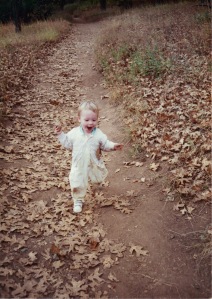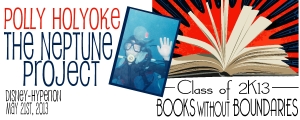I’m delighted to interview Tamera Will Wissinger about her charming new children’s novel in verse, GONE FISHING. Already this sweet little story about a boy going fishing with his father and sister has garnered some wonderful reviews. Kirkus Reviews states that, “This tender, well-crafted sibling story should hook many readers.” Publishers Weekly declares, “this book is just the thing for readers with a burgeoning interest in poetry—or angling.” And the Junior Library Guild featured GONE FISHING in their spring catalogue.
Much of your story centers around the charming relationship between the little boy in the story and his sister. Did you have a little brother or sister who drove you crazy when you were young?
Actually, I’m the middle child of three. I have an older sister who is close in age and a brother who is several years younger. As a result, I have the advantage of being both an older and a younger sibling. I have to admit that I based many of the little sister behaviors in the story on my relationship with my older sister – looking back I know I drove her crazy by getting into her things and always wanting to tag along. When I was writing this story, I remembered those instances when my sister was so frustrated with me and I tried to put myself in her shoes – I probably owe her an apology, although I did get some good poems out of those memories.
Fishing is such a magical pastime for your young hero. Did you go fishing with your parents when you were little? Do you still like to fish?
I did go fishing with my parents when I was young, and I still do when our schedules allow it. I also like to go fishing with my husband. Several scenes from the book are taken straight from my family fishing experiences. We were a little bit competitive, and I was known to befriend my bait. I was also the most likely in my family to talk or want to move around when we were supposed to be still and quiet, so in this case as well, I was my own role model for what not to do on the boat.
How did you manage to capture that sense of anticipation that children can feel so intensely? Are there any hints you can share with your fellow writers on how to write and convey childhood emotions vividly and effectively.
There are probably two things at play: first, I’m naturally an enthusiastic person and I get excited about very little things, so I may have infused that eagerness into my writing. Second, I’m lucky enough to remember my own childhood and that glowing “night before Christmas” feeling that something wonderful is about to happen.
As authors, if we can tap into our own memories or emotions of childhood enthusiasm or excitement, we’re well on our way to writing vividly in a child-friendly way. If memories are elusive, put yourself into a situation where they can surface. If possible – get away from your desk and go do that cool, exciting, or wacky thing that you did with gusto as a kid: ride a bike, twirl a baton, blow bubbles, squash through the mud in your bare feet, drop a line in the water… chances are, as you’re goofing off, those memories and the accompanying emotions will surface. If recollection is still vague, pay attention to what you’re feeling in that moment. Then be ready to capture those feelings in your writing.
I think that’s fabulous advice! Is it easier for you to write in prose or poetry?
Both have their challenges and virtues, so it really boils down to finding the best way for each story to be told. Sometimes a story comes to me through a series of poems. When that happens, writing the story in poems is easier. When the story emerges as a prose narrative, that’s the easier way to write it. Whatever happens to come forth, I try to go with the flow of words and then gently shape from there.
Do you have any advice for writers and poets who are considering submitting a novel in verse?
First and foremost, focus on good storytelling. A story in verse is a format and structure choice, so it’s always secondary to the story. Writing a story in poems adds a layer of constraint that – unless you absolutely must tell your story this way – you might want to resist. If you can’t resist, then don’t. Go ahead! Just go into it understanding what will be necessary to do it well.
Second, know why you’re writing a story in verse – for younger children this format might be a lighthearted way to deliver a story. For older MG and YA verse novels, the format sometimes, but not always, has something to do with the story. In other words, the main character is actually writing or journaling in poetry as part of the story. Regardless, I suspect that verse novel authors have very specific reasons for writing their stories in a series of poems.
Third, read and study a lot of poetry stories and really understand what those authors are doing to make their stories verse novels. There are some stories that are called novels in verse, but may really be “broken prose,” as Nikki Grimes has said, meaning that they aren’t poetry in the true sense of the word. When you work on your verse novel, make sure that it lives up to the term by using rhythm (and rhyme if appropriate), poetry techniques, and/or poetic forms.
What other projects do you have in the works?
Right now I’m working on more poetry, a couple of quirky picture books, and a historical fiction novel. I just learned that one of my picture books, a counting concept book, will release with Sky Pony Press in 2014!
I think that’s a good place to reel in and finish up this interview. I hope that you readers out there are now well and truly hooked. GONE FISHING releases March 5, and this is one terrific catch of a story you don’t want to let get away!



